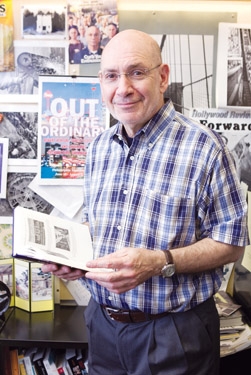Orvell adapts his approach to prepare the next generation of scholars
Typically, students benefit from a professor’s scholarly work when that professor brings his or her knowledge into the classroom. For students of Miles Orvell, professor of English and American Studies, that could not be truer.
However, in Orvell’s case, the reverse is also true. So strong is his investment in his teaching that his interactions with students have had a major influence on his scholarship.
“I got interested in the art and literature of the 1930s through teaching,” said Orvell. “I was recruited to teach a 12-credit “extraordinary course,” and it gave me the opportunity to develop an in-depth approach to that time period. My writing on depression-era literature and photography grew out of that.”
And it is for this work — which explores the intersection of literary, visual and technological culture in America with a focus on the early 20th century and the Great Depression — that Orvell has risen to major prominence in the field of American Studies.
He is the author of five single-authored books, including The Real Thing: Imitation and Authenticity in American Culture, 1880-1940, which won the John Hope Franklin Prize from the American Studies Association, and he serves as editor in chief of the Encyclopedia of American Studies. The respect he has earned in his field has been most recently recognized through his receipt of the Bode-Pearson Prize in American Studies. This lifetime achievement award, given by the American Studies Association, is awarded to the most prestigious figures in American Studies.
As remarkable as Orvell’s scholarly reputation is, it is equaled by his life-long commitment to teaching and to his students. In his 40-year career, he has taught at every level of instruction — from undergraduates in American literature and American Studies classes; to graduate students; to young professors, whose careers he has shaped and promoted.
His courses are well-known for their inventive interdisciplinary approach and for training students to “read” different cultural forms in sophisticated and nuanced ways.
Orvell has spent his teaching and scholarly career at Temple, having joined the faculty in 1969. In 1975, he began directing the American Studies program. According to one colleague, Orvell’s contributions to the American Studies curriculum were so extraordinarily innovative that the rest of the profession didn’t begin to catch up to it until nearly 15 years later.
Orvell says the profession took on a whole new meaning when he began to teach graduate courses and direct dissertations.
“The graduate courses were enormously challenging and required a depth of knowledge and intellectual engagement that you don’t normally bring to the undergraduate classroom,” he said. “I enjoyed helping graduate students develop scholarly positions, conceptualize their projects and sharpen their critical skills.
And, he found that the key to helping students at this level was listening.
“Listening is a big part of the process of mentoring,” he said, “which includes picking up on the subtleties that students articulate and helping them to build on these pieces, leading them to see what might not have been clearly visible before.”
“In teaching my survey course, I have been inspired by some of those examples, while at the same time updating the traditional lecture format to incorporate discussion,” Orvell said.
This ability and willingness to switch gears depending on the unique instructional context and particular needs of his students is what best characterizes Orvell’s approach. And his students at all levels have reaped the rewards.
